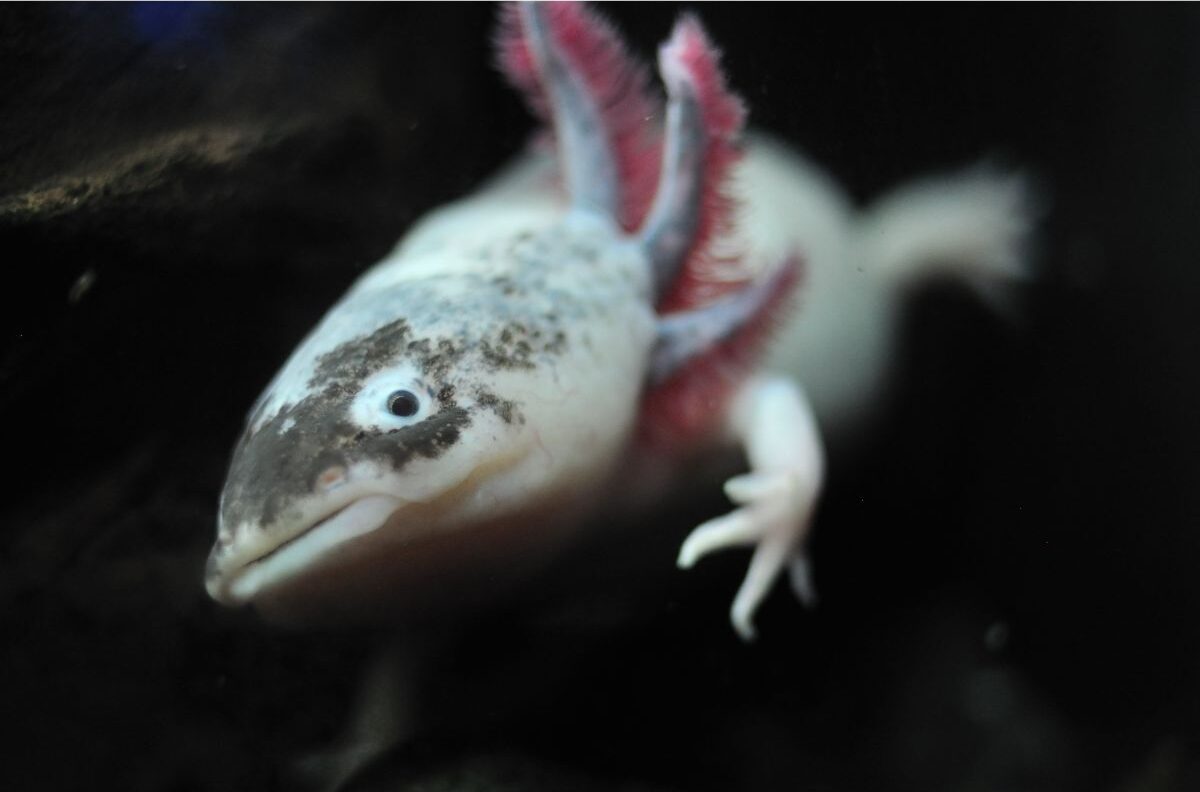Can axolotls bite and what happens if you are bitten by an axolotl? Do axolotls have teeth?
Axolotls can bite if they feel threatened or mistake your hand for food. Fortunately, axolotl teeth are not very sharp and if an axolotl bites you, there should be no major wounds.
Are Axolotls dangerous?
Axolotls aren’t dangerous to humans and are very relaxed animals. They rarely bite and if they do, they probably just mistook your hand for food or felt threatened.
On the other hand, if you want to keep fish or shrimp with your Axolotl, you will quickly find out that Axolotls consider any animal that fits in their mouth as food and can become dangerous to them very quickly if they are hungry.
That is why it is always advisable to keep Axolotl only with other similar-sized Axolotl and not with other animals.
Do Axolotl Bites Hurt?
Depending on how hard an axolotl bites, a bite can cause a bit of pain. That being said, axolotl bites are small and don’t result in large wounds.
If you have been bitten and your wound is bleeding, make sure to disinfect it and let it heal before you put your hand back in the tank.
If you want to prevent your axolotl from accidentally biting you, you can follow these tips:
- feed your axolotl with tweezers and not with your hand
- don’t make hectic movements with your hand in the water
- don’t get too close to the axolotl with your hand if it backs away
- get your axolotl used to your hand gradually and feed him from your hand so that it associates it with something positive
When feeding your Axolotl by hand, it can happen that your axolotl bites you. This is due to the poor eyesight of axolotls, they are farsighted and can only see things in their vicinity blurred. So it can happen that your axolotl confuses your finger with the food.
Do Axolotls have teeth?
Yes, axolotls have teeth in their upper and lower jaws. However, these teeth aren’t sharp and their main function is to hold prey. This is why axolotl teeth aren’t heavily calcified like ours and look more like little bumps in their mouths.
Their teeth are quite small and often not sharp enough to hurt you. While eating, axolotls don’t chew their prey, but swallow it whole. They do this by “sucking in” their food.
Are Axolotls aggressive?
Axolotls aren’t aggressive animals and if their fellow axolotls are about the same size, you can usually keep them together without any problems.
However, the situation is different when your axolotls are younger. Adolescent axolotls tend to be aggressive towards their siblings if they feel threatened. They may also try to eat them or take a bite out of them.Fortunately, bitten off limbs can grow back quickly due to the axolotl’s regenerative ability. Here is an article with more details about the regenerative ability of axolotls.
To prevent such problems, make sure they have enough space to get out of each other’s way and have hiding places. It is important that they are only kept together with other axolotls that are about the same size. Otherwise adult axolotls would eat baby axolotls.
Also, you should make sure to feed them enough so they don’t bite their mates out of hunger. The bigger the axolotls get, the less they try to eat their fellow axolotls and adult axolotls are rather relaxed animals.
Towards humans, axolotls usually don’t show aggression. And since they aren’t territorial, they would rather swim away than try to fight if they feel threatened.
Can Axolotls transmit diseases?
Axolotls can be carriers of diseases, even if such cases are rather rare and easy to avoid.
The main pathogen is salmonella. They live in the digestive tract of the axolotl and are also excreted into the water through their feces. These microorganisms aren’t harmful to axolotls, but humans can become infected with them.
Some symptoms of salmonella infection include: Diarrhea, stomach cramps, and sometimes fever. Most of the time, infections with salmonella that come from axolotls only occur in people with weakened immune systems and fortunately, this can be easily prevented.
An important rule is to wash your hands thoroughly before and after any interaction with your axolotl or the aquarium water. Also, don’t put your hand into the tank if you have any open wounds.
Are Axolotls poisonous?
Some close relatives of the axolotl, such as the tiger salamander and fire salamander, can secrete toxic slime from their skin when they feel threatened.
In humans, the toxic mucus causes a burning sensation on the skin. Dogs and cats that try to eat the fire salamander may experience symptoms of poisoning such as increased blood pressure and respiratory paralysis.
Axolotls, on the other hand, aren’t poisonous and you can touch them without hesitation (or even eat them, like in some countries in gourmet restaurants).
Conclusion
Axolotls aren’t dangerous for humans and even if they bite once, no major harm should result. It is best to slowly accustom your axolotl to your hand so that it doesn’t panic and bite you out of fear. If your axolotl accidentally bites you while feeding, it is probably due to their poor eyesight and is not intentional.

